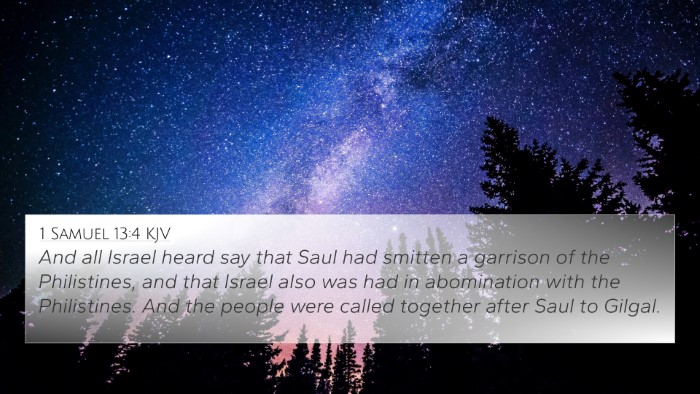Understanding 1 Samuel 27:12
Verse: "And Achish believed David, saying, He hath made his people Israel utterly to abhor him; therefore he shall be my servant forever." (1 Samuel 27:12)
Contextual Overview
The context of this verse is crucial. David, fearing for his life from King Saul, sought refuge with the Philistines. He allied himself with Achish, the king of Gath, presenting himself in such a way that Achish trusted him. Achish believed that David had turned against his own people, Israel, and saw David as a potential ally instead of a threat.
Commentary Insights
- Matthew Henry: Henry emphasizes that David’s strategy of living among the Philistines demonstrates both his cunning and desperation. Achish’s belief in David’s loyalty wasn't just a political move; it was an indication of how David was perceived amid his own people’s conflicts.
- Albert Barnes: Barnes draws attention to the political implications of David’s actions. He states that Achish's interpretation of David's recent activities could have stemmed from an underestimation of the risks associated with David. This reflects a broader theme of trust and betrayal in leadership.
- Adam Clarke: Clarke focuses on the emotional and spiritual toll this scenario represents. He suggests that David’s circumstances reflect the struggles faced by believers when dealing with non-believers. David, while living among the Philistines, had to navigate the complex web of loyalty and faith amid compromise.
Thematic Connections
This verse reveals several critical themes within the biblical narrative:
- The Danger of Compromise: David’s choice puts him in moral peril, raising questions about fidelity to God versus survival instincts.
- Trust and Betrayal: Achish's misplaced trust in David sets a backdrop for examining relationships based on misunderstanding and deception.
- God’s Sovereignty: Even in David’s missteps, God's overarching plan for David as king unfolds, suggesting divine providence at work despite human frailty.
Cross-References
Understanding 1 Samuel 27:12 benefits greatly from linking it to other scriptures:
- 1 Samuel 22:1-2: David’s gathering of supporters reflects early signs of his leadership amidst adversity.
- 1 Samuel 24:10-11: Both illustrate David’s integrity in the face of Saul’s pursuit and his non-revengeful spirit.
- 1 Samuel 30:1-6: This passage illustrates David’s reliance on God amid personal trials and communal stress.
- Psalm 56:3-4: David’s faith shines through fear, emphasizing trust in God over human relationships.
- Psalm 37:5: This affirms David’s eventual restoration and reliance on God's justice.
- 2 Samuel 1:14: Reflects on the theme of loyalty, especially the cost of being faithful to one’s people.
- Proverbs 3:5-6: A reminder to trust in the Lord, juxtaposing David’s moment of choice with divine guidance.
Inter-Biblical Dialogue
The connections between 1 Samuel 27:12 and other verses resonate through the Old and New Testament, offering a dialogue that hints at broader biblical themes:
- Matthew 10:16: Jesus encouraging His followers to be shrewd, akin to David's navigations.
- Acts 4:19: The necessity of choosing God's truth over human expectations aligns with David's struggle.
Using Bible Cross-References
For deeper insight, employing a Bible concordance or cross-reference guide can significantly enhance your understanding while studying biblical texts:
- Utilizing tools for Bible cross-referencing helps establish thematic connections across scripture.
- Employing a Bible cross-reference system is fundamental for exploring relationships among passages.
- Cross-reference Bible study offers methodologies that solidify comprehension through interconnections.
Conclusion
This analysis of 1 Samuel 27:12 reveals multifaceted themes that are enriched through understood contexts and fruitful cross-referencing. As one engages with these connections, they become better equipped in spiritual understanding and biblical literacy, ultimately enhancing their personal study and interpretation.




